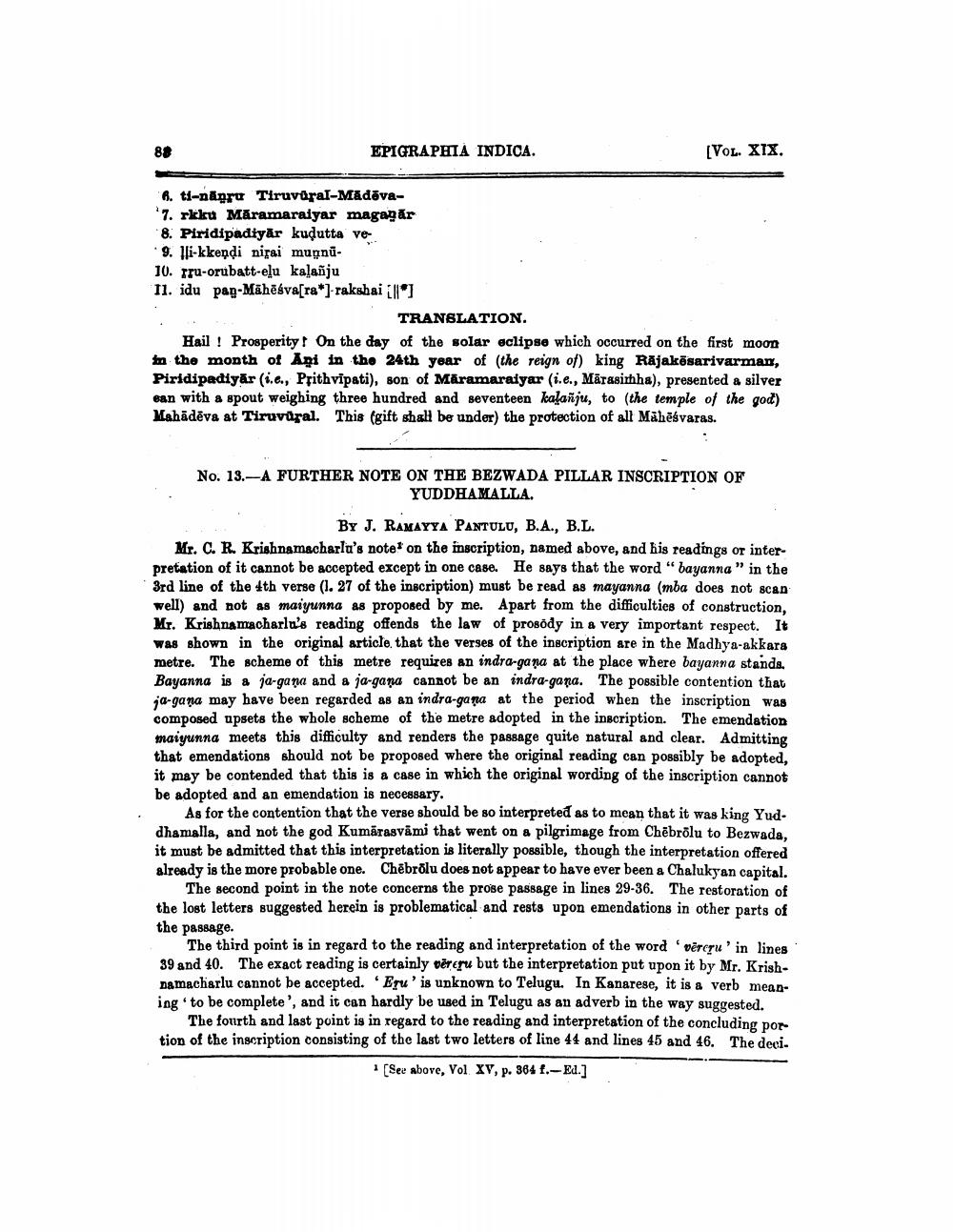________________
82
EPIGRAPHIA INDICA.
(VOL. XIX,
6. ti-näpru Tiruvöral-Mädēva7. rkku Māramaraiyar magagar 8. Piridipadiyar kudutta ve9. llikkeņdi nisai mugnu 10. rru-orubatt-elu kalaõju 11. idu pag-Māhēsva[ra*]-rakshai illo]
TRANSLATION. Hail ! Prosperity! On the day of the solar eclipse which occurred on the first moon In the month of Api in the 24th year of the reign of) king Rājakõsarivarman, Piridipadiyār(i.6., Prithvipati), son of Māramaraiyar (i.e., Mārasithha), presented a silver ean with a spout weighing three hundred and seventeen kafanju, to the temple of the god) Mahädēva at Tiruvural. This (gift shall be under) the protection of all Mābēsvaras.
No. 13.-A FURTHER NOTE ON THE BEZWADA PILLAR INSCRIPTION OF
YUDDHAMALLA.
BY J. RAMAYYA PANTULU, B.A., B.L. Mr. C. R. Krishnamacharla's note on the inscription, named above, and his readings or interpretation of it cannot be accepted except in one case. He says that the word “bayanna" in the 3rd line of the 4th verse (1. 27 of the inscription) must be read as mayanna (mba does not scan well) and not as maiyunna as proposed by me. Apart from the difficulties of construction, Mr. Krishnamacharlu's reading offends the law of prosody in a very important respect. It was shown in the original article, that the verses of the inscription are in the Madhya-akkara metre. The scheme of this metre requires an indra-gana at the place where bayanna standa. Bayanna is a ja-gana and a ja-gana cannot be an indra-gara. The possible contention that ja-gana may have been regarded as an indra-gara at the period when the inscription was composed upsets the whole scheme of the metre adopted in the inscription. The emendation maiyunna meets this difficulty and renders the passage quite natural and clear. Admitting that emendations should not be proposed where the original reading can possibly be adopted, it may be contended that this is a case in which the original wording of the inscription cannot be adopted and an emendation is necessary.
As for the contention that the verse should be so interpreted as to moan that it was king Yud. dhamalla, and not the god Kumārasvami that went on a pilgrimage from Chēbrölu to Bezwada, it must be admitted that this interpretation is literally possible, though the interpretation offered already is the more probable one. Chēbrolu does not appear to have ever been a Chalukyan capital.
The second point in the note concerns the prose passage in lines 29-36. The restoration of the lost letters suggested herein is problematical and rests upon emendations in other parts of the passage.
The third point is in regard to the reading and interpretation of the word 'vëreru' in lines 39 and 40. The exact reading is certainly neregu but the interpretation put upon it by Mr. Krishnamacharlu cannot be accepted. Eru' is unknown to Telugu. In Kanarese, it is a verb meaning to be complete', and it can hardly be used in Telugu as an adverb in the way suggested.
The fourth and last point is in regard to the reading and interpretation of the concluding portion of the inscription consisting of the last two letters of line 44 and lines 45 and 46. The deci.
[See above, Vol XV, p. 364 1.-Ed.]




